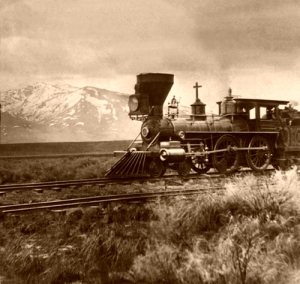In 1835 Thomas Tredgold, a British railroad designer, said: “that any general system of conveying passengers would…go at a velocity exceeding ten miles an hour, or thereabouts, is extremely improbable.” In 1868 Representative Cadwallader C. Washburn of Wisconsin told the United States Congress, that “the possession of this Russian territory [that is Alaska] can give us neither honor, wealth, or power, but will always be a source of weakness and expense, without any adequate return.”
In 1876 Custer, upon first seeing through field glasses the Sioux Indian encampment at the Little Bighorn River said: “Hurrah, boys, we’ve got them now.” In 1888 Simon Newcomb, the director of the United States Naval Observatory said: “We are probably nearing the limit of all we can know about astronomy.” In 1895 Lord Kelvin, British mathematician and President of the British Royal Society, said: “Heavier-than-air flying machines are impossible.” In 1943 Thomas J. Watson, chairman of the board of International Business Machines (IBM), said, “I think there is a world market for about five computers.” In the summer of 1945 Admiral William Leahy told President Truman about the atomic bomb: “That is the biggest fool thing we have ever done…The bomb will never go off, and I speak as an expert in explosives.”
On 3 January 1956, a little more than a year before the orbiting of Sputnik 1 and the dawn of the space age, the British Astronomer Royal, Dr. Richard van der Riet Woolley, told a press conference that the talk of going into space was ridiculous. “It’s utter bilge,” he said. In 1961 T.A.M. Craven, Federal Communications Commissioner, told a Senate oversight committee that “there is practically no chance communications space satellites will be used to provide better telephone, television, or radio service inside the United States.”
What does this recitation of inaccurate predictions have to say to the nature of humanity? I have several answers ranging from the sublime to the ridiculous to perhaps the insightful.
First, and most obviously, it suggests that it is probably not a great idea to make a lot of sweeping predictions about what the future holds. From this set of anecdotes to the visions of tomorrow captured in literature, film, world fairs, and amusement parks, the predictors are invariably wrong and in hindsight seem enormously silly.
Second, in many cases these predictions perhaps proved false because they spurred those involved in trying to overcome the technological challenges the experts said could never be overcome. Perhaps those types of predictions, therefore, serve a useful purpose in focusing attention on the issue and increasing the persistence of researchers. For instance, when the Astronomer Royal of Great Britain announced that space flight was “utter bilge”, as he called it, it steeled several of those in the Space Task Group at the Langley Aeronautical Laboratory in Hampton, Virginia, who were working on the question. That was the organization that conceptualized Project Mercury and the group that moved to Houston in 1962 and settled into what became eventually the Johnson Space Center.
Third, is anything really impossible? These people, all presumably smarter than the average people in their fields, said, “it couldn’t be done.” Their conclusions point up the conventional wisdom of experts at the time. Why did others fail to head their wisdom and dare to dream?
Finally, I am certainly glad that those who dared to dream were not dissuaded by the conventional wisdom of the experts. If they had been deferential enough to listen to the experts we might not have airplanes. If they had believed what Tom Watson of IBM said in 1943, we might have only five computers today. If any number of scientists and engineers had believed the Astronomer Royal we might never have tried to build a spacecraft and traveled even into Earth-orbit, much less to the Moon. When someone of importance says something cannot be done, I believe, then it almost certainly will eventually happen.
Conceptualizing the possibility, furthermore, leads a long way toward making it happen. If one cannot believe that something, choose the subject you wish, is possible, I can guarantee that it will not happen. The first step toward making something a reality is to conceive of it, to visualize it. If it can be imagined, perhaps it can be done. This began to happen with space flight in the 1940s and 1950s and it led directly to the greatest adventure in American history, the exploration of the Moon.
What might happen in the future?




“What might happen in the future?” Wonderful things….if we can just get past the universal stumbling block…politics.
LikeLiked by 1 person
Sadly this is true too. Fear and greed are powerful enemies.
LikeLike
Reblogged this on BBG.
LikeLike
This is a brilliant post. Of course there are those who specifically like to take on challenges they’ve been told are impossible (and in agreement yes, they CAN visualize solutions to those challenges).
I understand the mindset. It’s beyond imagination and conception. It’s an indomitable sense of hope.
LikeLike
Wonderful post. Visualizing concepts drives every human activity, from cutting a board to landing on the moon.
LikeLike
We face a potential catastrophe wrought in part by driving ahead into the future without due cognizance of consequences. I dream a world where we get through that crisis time without too much death and destruction and emerge on the other side wiser than we are now. That might sound like a downer, but I think that dreaming a hopeful future on the far side of a frightening challenge is the biggest, boldest dream of all.
dsfp
LikeLike
P.S. This was a nice post to read on my birthday. 🙂
LikeLike
Keep in mind survivor bias. Beyond these few examples, how many times has someone said, “It can’t be done” and been right.
LikeLike